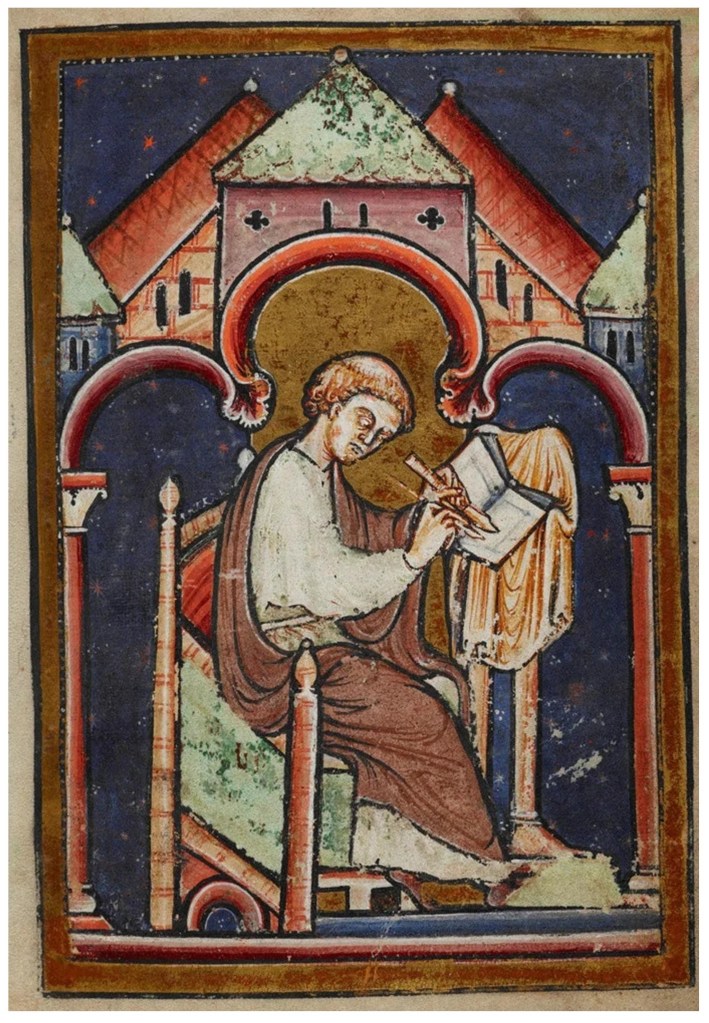
A long time ago now, I picked up a copy of St. John’s Gospel which had on the cover: Remember, you may be the only copy of the Gospel someone will ever read.
There is such truth in that.
We receive the Good News of God in many ways, but we learn the story, the ‘adventure of God in Jesus’,often by being introduced to it by someone for whom the words of the Gospel have become ‘real’. As the words above suggest, we are copies of that Gospel.
The New Testament is an open-ended book. We are still writing it with our lives.
Christians are just observing, once again, Holy Week, the time when we refresh our lives with all that Jesus means to us and all the love of God he shows to us. It is also a time of re-offering our own lives back to God so that we can be used in the service of the Gospel.
In that re-offering we are, as it were, taking up our pen of faith and dipping it into the love of God.
Manuscripts of the Bible, and especially the Gospel accounts were beautifully produced in the early Church. The Book of Kells in Dublin; the Gospel made at Lindisfarne and so many others are examples of how the Good News of Jesus was celebrated in written form. Missionary monks in Britain would usually travel with a copy of the Gospel. This was their preaching book. The more embellished and wonderfully decorated copies were written because of a deep love of a saint. The Lindisfarne Gospel was made in honour of St. Cuthbert. Of course, most of all, they were signs of a deep love for God, for Jesus.
As with Icon writing, (painting), they were deeply instilled with prayer.
Through prayer and skill the manuscripts became expression of the faith of those who made them.
All acts of love for God are truly genuine when we put our whole being into them.
A medieval monk preached a sermon in Durham Cathedral in which he used the tools that are needed to make a manuscript as spiritual aids to help us put ourselves into our witness to God.
This is part of what he said:
“The Parchment on which the manuscripts are written is pure conscience; The knife that scrapes the skin making it smooth for writing is likened to the love of God, the awe with which we hold him as he, like the knife in the hand of the skilled manuscript writer, scrapes away all that is within us which turns us away from God and prevents us truly loving him. The pumice that smoothes the skin is the discipline of heavenly desire and the chalk which whitens it signifies an unbroken meditation of holy thoughts. The ruler for the lines of text is the will of God and the straightedge is devotion to the holy task. The quill with its end split in two for writing represents the love of God and love of neighbour and the ink is humility itself. The colours used by the illuminator is a reminder of God’s grace and wisdom which colours our lives. The writing desk is the tranquillity of the heart and the writing place is a contempt of worldly things as the holy work lifts us to a desire for heaven. The model or exemplar for the work is Jesus Christ.
The monk who wrote this allegory used the everyday things needed to produce a beautiful manuscript for God’s glory as aids for his spiritual journey in copying the Gospel for others to read it.
It is a reminder to us that it is in the ordinary things that we can find God. Teresa of Avila called this, God walking among the pots and pans. Making connections between the ordinary things in our lives and Gods can help us in our praying.
This prayer written by a lady on a Celtic Retreat I led, makes this connection between the material and spiritual:
Vellum, parchment, stone, wood and skin
all marked by the writer to convey the word of God.
Yet God, in mystery, appears to fleshly hearts, made pure,
writing upon these the very word of God,
that they can be read of human –
true icons of Christ.
The Word, made flesh, dwells with us.
The Christian Holy Week pilgrimage brings us closer to the love God shows us through Jesus.
As we pray through our journey we are being invited by God to become living Manuscripts of His love for the World.
It certainly needs to read it.